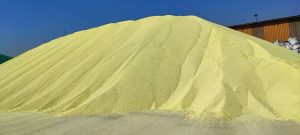 Introduction:
Introduction: is an essential element with diverse applications across multiple industries. This article delves into the different forms of sulfur, namely granular sulfur, lump sulfur, pastillated sulfur, and powdered sulfur. Understanding these variations is crucial for selecting the appropriate form for specific industrial and commercial purposes.
is an essential element with diverse applications across multiple industries. This article delves into the different forms of sulfur, namely granular sulfur, lump sulfur, pastillated sulfur, and powdered sulfur. Understanding these variations is crucial for selecting the appropriate form for specific industrial and commercial purposes.
1. Granular Sulfur:
Granular sulfur refers to sulfur that has been processed into small, granular particles. It is commonly used in agricultural applications as a soil amendment and fertilizer. Granular sulfur slowly releases sulfur into the soil, aiding in the growth of sulfur-dependent plants and improving overall soil health. Additionally, granular sulfur is utilized in the production of sulfuric acid, chemical manufacturing, and as a raw material in the rubber industry.
2. Lump Sulfur:
Lump sulfur, also known as brimstone, refers to sulfur in its elemental form. It occurs naturally as large, solid chunks or irregular pieces. Lump sulfur has various applications, including the production of sulfuric acid, detergents, and pharmaceuticals. It is also used as a fungicide in agriculture and as a component in the vulcanization of rubber. Lump sulfur is typically melted or crushed to obtain other forms of sulfur.
3. Pastillated Sulfur:
Pastillated sulfur is a processed form of sulfur that is shaped into small, cylindrical pellets or pastilles. This form of sulfur is commonly used in industrial applications, such as the production of fertilizers and sulfur concrete. Pastillated sulfur offers ease of handling and accurate dosing, making it suitable for bulk transportation and storage. It is also used as a raw material in the manufacturing of fireworks, matches, and insecticides.
4. Powdered Sulfur:
Powdered sulfur refers to sulfur that has been finely ground into a powder form. It is utilized in a wide range of applications, including agriculture, pharmaceuticals, and the production of sulfuric acid. In agriculture, powdered sulfur is used as a fungicide and acaricide to control various plant diseases and pests. It is also employed in the manufacturing of cosmetics, skincare products, and rubber compounds.
Conclusion:
Sulfur, in its different forms such as granular sulfur, lump sulfur, pastillated sulfur, and powdered sulfur, offers diverse applications across multiple industries. Each form has its unique characteristics and benefits, catering to specific industrial and commercial needs. Understanding the properties and uses of these various forms of sulfur enables informed decision-making in selecting the most suitable form for specific applications. As research and technological advancements continue, the utilization of sulfur is expected to expand, contributing to advancements in various sectors, including agriculture, chemicals, and manufacturing.